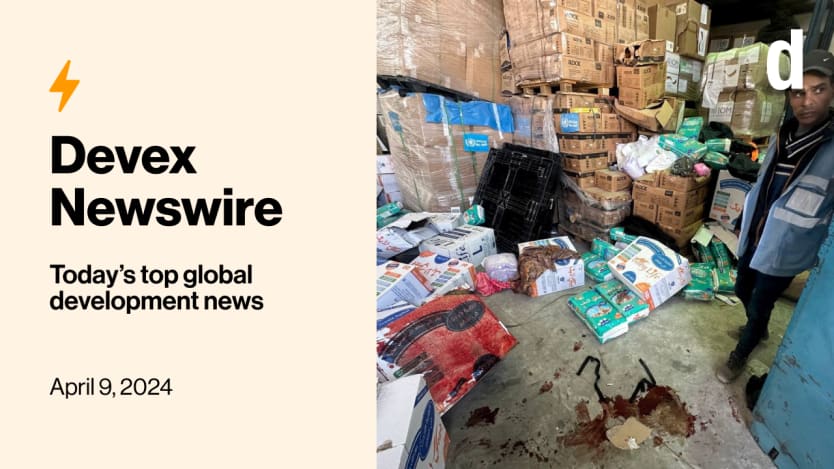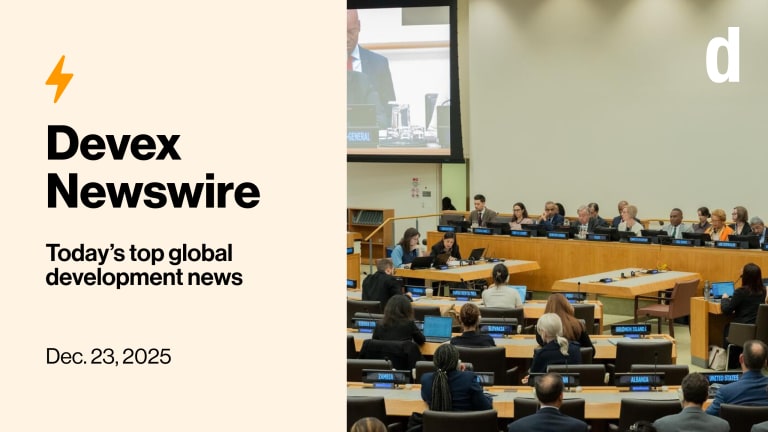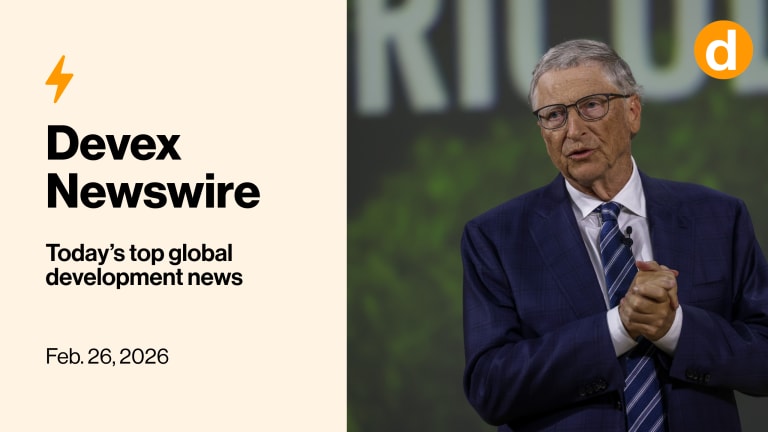Devex Newswire: Israel seemingly blocks UN agencies in Gaza at every turn
Presented by The Mastercard Center for Inclusive Growth

Israel has vowed to deliver more humanitarian assistance to Gaza. But U.N. agencies will believe that when they see it — if the current impasse is any indication.
Also in today’s edition: We have a scoop about a shake-up at the World Health Organization. Plus, a Hollywood doppelgänger — in name only — takes over BRAC USA.
+ For introverts, this upcoming Devex Career Event is for you: How to network when you hate networking. Save your spot now.
String of denials
Israeli Prime Minister Benjamin Netanyahu seems to have yielded to pressure from U.S. President Joe Biden to open up more humanitarian routes into what’s left of the Gaza Strip.
At the same time, Israel has been ramping up its own pressure campaign to disrupt and dismantle UNRWA, the U.N. agency leading the humanitarian response in Gaza, sparking concern among senior U.N. officials that the action is undermining international efforts to halt suffering and famine in the strip.
This is a preview of Newswire
Sign up to this newsletter for an inside look at the biggest stories in global development, in your inbox daily.
On April 1, Israel denied a request by UNRWA to evacuate injured Palestinians and assess the damage at al-Shifa Hospital in Gaza City following the latest Israeli raid, according to a copy of the email denial reviewed by my colleague Colum Lynch.
The blockage of safe passage for UNRWA — which was part of a scheduled convoy to the north led by WHO — prompted the U.N. health agency to cancel its plans to visit al-Shifa. In the end, WHO was able to access the hospital nearly two weeks after its initial attempt.
The episode illustrates the degree to which even U.N. agencies encouraged and authorized to deliver assistance by Israel have been stymied. Topping that list is UNRWA, even though it possesses critical logistical and security expertise that other U.N. agencies lack in Gaza.
“UNRWA, as we have said over and over again, is the backbone of our humanitarian operations,” Stéphane Dujarric, the U.N.’s chief spokesperson said at an April 3 press conference in response to a question from Devex. “No one has the resources, the manpower, the logistics networks that UNRWA has.”
That said, he added: “It’s not as if we’re seeing a situation where WFP [World Food Programme] convoys are being waved through with a green flag into the north. I mean the challenges are U.N.-wide.”
Exclusive: UNRWA restrictions hamper Gaza relief by broader UN
WHO’s in and WHO’s out
WHO is reshuffling its leadership team yet again, with Dr. Michael Ryan, executive director of its health emergencies program, taking on the additional role of deputy director-general of WHO.
Director-General Tedros Adhanom Ghebreyesus announced Ryan’s appointment in an internal email sent to staff that was seen by my colleague Jenny Lei Ravelo. As the new DDG, Ryan will represent Tedros internally and externally “on all matters delegated to him,” according to the April 4 email.
Ryan first joined WHO in 1996. He has worked in conflict settings and led numerous responses to contain disease outbreaks, including COVID-19 and the SARS epidemic. He left the agency in 2011 and moved back to Ireland, but returned in 2017 when Tedros became head of the agency.
Zsuzsanna Jakab had been WHO’s deputy director-general since 2019. Tedros asked her to postpone her retirement in 2022 and stay on as his deputy as well as officer in charge of the regional office for Western Pacific “for some more time” amid a racism scandal at the Western Pacific office that saw its former director dismissed for misconduct.
Jakab retired in February, according to WHO.
In somewhat related news, there’s been another shake-up in the health world: Dr. Ebere Okereke has resigned as CEO of the Africa Public Health Foundation, which works to mobilize resources for the Africa Centres for Disease Control and Prevention. She started the job in May last year and will depart from her role at the end of May. She tells my colleague Sara Jerving: “My decision is truly personal as I want to focus more intentionally on my passions and to have time for other interests.”
Scoop: Mike Ryan is WHO's new deputy director-general
+ For more content like this, sign up to Devex CheckUp, our free, weekly global health newsletter.
Not that Julia Roberts
Nothing will grab people’s attention quite like one of Hollywood’s biggest stars becoming the leader of a big NGO. So when our newsroom received a press release with the subject line “Julia Roberts named as BRAC USA's new CEO!” — we did a collective double take.
Alas, for fans of “Pretty Woman” and “Steel Magnolias,” it seems Roberts is sticking to the big screen for now.
But plenty of people in our sector are likely to be excited about the other Julia Roberts, a 30-year global development veteran who comes to BRAC from Population Services International, where she was vice president of global fundraising and communications. She’s also worked for USAID and the U.S. Centers for Disease Control and Prevention and was a Peace Corps volunteer to boot.
Roberts will lead BRAC USA in the next phase of its growth, supporting the global organization, which is headquartered in Bangladesh, as it expands throughout Asia and Africa to help lift 250 million people out of poverty by 2030.
The search for a new CEO began in September 2023 after the previous CEO, Donella Rapier, set February 2024 as the date of her retirement. Roberts will start her new role on April 29.
From our archives: Does BRAC offer a different model for development organizations? (Pro)
+ A Devex Pro membership gives you access to all our expert analyses, funding data, the largest globaldev job board, exclusive events, networking opportunities at our summits, and more. Not a Pro member yet? Start your 15-day free trial today.
Wine not
“Nothing about us without us.”
— USAID Administrator Samantha PowerThat’s the promise Power made to more than 1,800 local organizations, networks, and grassroots leaders who signed a globally circulated letter demanding change in the foreign aid dynamic.
“The very idea of locally led development is about local actors shaping the agenda,” Gunjan Veda, the U.S. executive director of The Movement for Community-led Development, or MCLD — one of the letter’s facilitators — tells my colleague Elissa Miolene. “If that is not happening, then the conversations on locally led development will be old wine in a new bottle.”
The open letter was coordinated by MCLD, a network that advocates for locally led leadership; CIVICUS, which focuses on strengthening citizen action; and Peace Direct, an organization that works with local groups to end conflict. Though originally published in November, the number of signatories has ticked up in the months since.
Read: No events about you without you, Samantha Power tells local leaders
In other news
The economy of sub-Saharan African countries is set to grow in the next two years, but not enough to have any significant effect on poverty reduction in the region, according to a World Bank report. [Reuters]
Zambia is experiencing the worst drought it has seen in 20 years, U.N. officials say while urging a humanitarian response. [VOA News]
The U.N. Security Council on Monday referred Palestine’s bid for U.N. membership to the global body’s membership committee, which will decide on the application this month. [Al Jazeera]
Sign up to Newswire for an inside look at the biggest stories in global development.
Search for articles
Most Read
- 1
- 2
- 3
- 4
- 5








